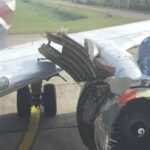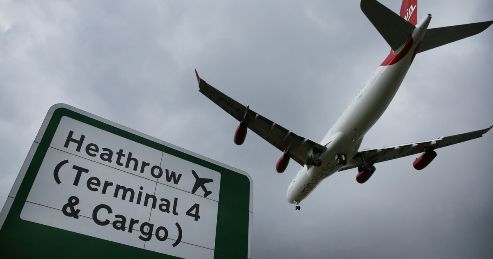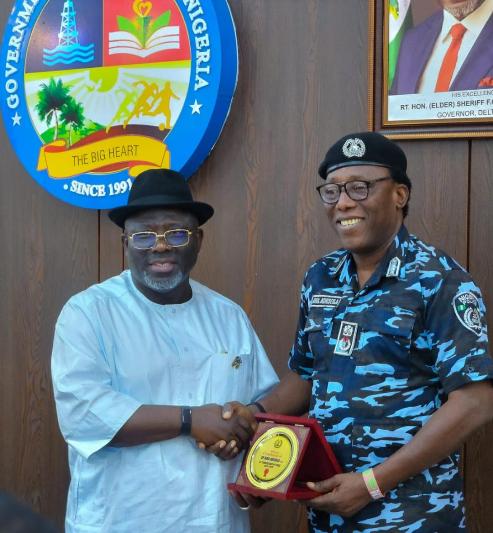LAGOS APRIL 20TH (NEWSRANGERS)-A United Kingdom tribunal has held that a Nigerian be fined the sum of £26,835 (over N15 million) after being charged in relation to 61,800 cigarettes found in his bag without appropriate disclosure to relevant revenue authorities. The cigarettes were seized at Heathrow Airport, London, in February 2020.
Details of the judgement are contained in an appeal filed by the Nigerian, Oladipupo Fagbewesa, against the civil evasion penalty issued on 21 June 2021.
In court documents seen by PREMIUM TIMES, the tribunal judge, Abigail Mcgregor, held that Mr Fagbewesa owned the cigarettes that were seized from his bags and subsequently upheld the penalty.
According to the court document dated 12 April, the Notice of Appeal was submitted to the tribunal just over a month late and was received on 23 September 2021. An explanation for the lateness was given in the Notice of Appeal, the document said.
The reasons for the lateness include, among others, the fact that the conclusion letter, dated 14 July 2021, was not received by Mr Fagbewesa until 14 August 2021 because he had been away in Nigeria caring for his sick mother for a 3-week period from 25 July 2021. Similarly, the document said Mr Fagbewesa works at night and therefore has limited time in the day to seek legal advice; he found affordable legal advice on 27 August 2021; English is not his first language and he had trouble understanding the procedure.
Based on the reasons given and the absence of objection from the HM Revenue and Customs, a non-ministerial department of the UK Government responsible for the collection of taxes, the court decided to admit the appeal late.
But after hearing arguments from the parties, the tribunal ruled that the seized cigarettes belonged to Mr Fagbewesa and upheld the £26,835 penalty against him.
Backstory
Details of the case as contained in the tribunal judgement said that Mr Fagbewesa was scheduled to return from Lagos, Nigeria, to Heathrow Airport, UK on 11 February 2020 but the flight was delayed due to bad weather. He finally arrived at Heathrow on 14 February 2020 but his bags had not arrived at the same time.
On 15 February 2020, Mr Fagbewesa’s bags arrived at Heathrow and were checked by the Border Force. However, empty bags were returned to Mr Fagbewesa at home on 16 February 2020 and on 12 May 2021, HMRC wrote to Mr Fagbewesa seeking information in relation to the seized goods, and noting that they had reason to believe that he had engaged in conduct involving dishonesty.
On 26 May 2021, the HMRC wrote to the appellant, Mr Fagbewesa, again stating that he may be exposed to a penalty in the sum of £28,248. On 21 June 2021, the HMRC finally issued a Notice of Assessment to the appellant in the sum of £26,835 pursuant to s 25(1) Finance Act 2003 and s 8(1) Finance Act 1994. The calculation included a 5 per cent reduction for cooperation.
Scope of Appeal
While there had been a number of legal arguments put forward prior to the hearing, the document showed that the parties had, by the time of the hearing, agreed that the core question to decide was whether Mr Fagbewesa was the owner of the cigarettes that were seized.
For the purposes of the appeal, Joshua Carey, counsel to the HMRC, submitted that the revenue outfit accepted that if the court found that the cigarettes did not belong to Mr Fagbewesa, the penalty would fall away. On the other side, for the purposes of the appeal, Macpherson Mickel, counsel to Mr Fagbewesa, conceded that if the tribunal finds that Mr Fagbewesa was the owner of the cigarettes, then the dishonesty automatically follows.
“Therefore, our findings of fact on the ownership of the cigarettes are determinative of the appeal,” the judge said.
The court document also showed that Section 8 of the Finance Act 1994 (FA 1994) provides for a penalty for the evasion of excise duty. Subsection (a) on penalty stated that where “…(a) any person engages in any conduct for the purpose of evading any duty of excise, and (b) his conduct involves dishonesty (whether or not such as to give rise to any criminal liability)…”, “that person shall be liable to a penalty of an amount equal to the amount of duty evaded or, as the case may be, sought to be evaded.”
With regards to customs duty or import VAT civil evasion penalties, section 25 of Finance Act 2003 (FA 2003) provides that “where– (a) a person engages in any conduct for the purpose of evading any relevant tax or duty, and (b) his conduct involves dishonesty (whether or not such as to give rise to any criminal liability), that person is liable to a penalty of an amount equal to the amount of the tax or duty evaded or, as the case may be, sought to be evaded.”
Defence
In his argument, Mr Mickel, lawyer to the Nigerian, argued that the bags were outside of Mr Fagbewesa’s control from 11 February 2020 when they were checked in at Lagos airport until they were returned to him on 15 February 2020. He added that Mr Fagbewesa did not put any cigarettes in the bags and they were not in there when he checked in his bags at Lagos airport.
He argued further that while his evidence may not be 100 per cent reliable given the “effluxion of time” (approximately 3 years), he is a credible witness and is very clear that he did not know about the cigarettes. He added that speculation as to how the cigarettes got into the bags is not relevant to the question, and HMRC did not meet the balance of probabilities burden of showing that Mr Fagbewesa owned the cigarettes.
Meanwhile, in his letter of appeal to HMRC dated 2 February 2021, Mr Fagbewesa had stated: “I phoned BA customer service and I explained to them the situation of what has happened to my bags. I was told the matter will be investigated and will be resolved. It was after few weeks UK went into national lockdown due to the COVID-19 pandemic. I have attached with this letter, emails evidence I received from British airways airline regarding this matter”.
But Joshua Carey, counsel to the HMRC, argued that the story of not owning the cigarettes “has been dreamt up in order to avoid the penalty” because the only potential way in which Mr Fagbewesa’s position can be true requires “a conspiracy that is implausible in the extreme, namely that persons unknown obtained access to the bags after check-in and they, or another accomplice, expected to be able to obtain access to the bags again before Mr Fagbewesa picked up the bags at Heathrow, all on the “fly-side”, that is within the secure parts of both airports.”
He argued further that Mr Fagbewesa’s evidence is not credible.
Discussions
The judge said that the court heard evidence from Mr Curtis, a border control officer, regarding the discovery and seizure of the cigarettes. In addition, it heard evidence from one Mr Crozier, HMRC officer, regarding the timeline in the run-up to raising the assessment and his decision-making process for doing so.
“We found both of these witnesses to be honest, credible and reliable,” the judge said.
“We also heard evidence from Mr Fagbewesa. We did not find his evidence credible or reliable. There were many inconsistencies in his evidence, both internally within the evidence given at the hearing and externally when compared with evidence provided previously in witness statements and in documentary correspondence with HMRC.
“We find that when Mr Fagbewesa realised that his bags were not available to collect on 14 February 2020, he approached staff for British Airways (the carrier for his flight) who advised him that he needed to fill out a BOR 1422, being the Border Force form called “Clearance of Missing or Delayed Baggage – Non EU arrivals”. We find that Mr Fagbewesa filled out that form, identifying his 4 black bags. He signed the form immediately under the declaration that reads: “I declare that I have read ‘Bringing goods into the UK from outside the EU’ poster and the warning and that the answers to the questions and the particulars I have given on this form are true and complete’. He also provided his address and telephone number and dated the form. The form did not disclose any cigarettes.”
The court found that on the morning of 15 February 2020, Mr Curtis inspected 4 black holdalls that were unaccompanied. He was handed the BOR 1422 by the member of British Airways staff who had alerted him to the bags and he matched the bags to the details on the BOR 1422. The luggage tags on the bags included Mr Fagbewesa’s name and the flight number, the judge said.
Having felt the bags, the judge said, Mr Curtis considered that they contained boxes and decided to investigate further. He opened the bags, “using the jiggler that Border Force officers carry for the purposes of opening locks on bags – a kind of skeleton key.”
“In the skeleton argument for the Appellant, Mr Macpherson Mickel had suggested that the use of a key meant that the keys must have been attached the luggage,” the judge said.
“The written witness statement of Mr Fagbewesa did not mention padlocks or keys at all.”
The judge added that in evidence given orally at the hearing, Mr Fagbewesa stated that his holdalls were not locked at all and that any padlocks on them were added after he had checked them in Lagos. He also stated that he had told his solicitor at the beginning that the bags were not locked.
Verdict
Speaking on the question of how the cigarettes would have got into the bag if Mr Fagbewesa did not put them there, Mr Carey argued that the alternatives were implausible in the extreme, requiring several people acting in concert within the airline industry in both Lagos and Heathrow in order to have had access to the bags after Mr Fagebwesa had checked them in and before he picked them up at Heathrow. Mr Macpherson argued that the luggage had been outside of Mr Fagbewesa’s control for several days and it was possible that someone else had interfered with the luggage in that time
While Messrs Curtis and Fagbewesa answered questions about the processes behind the scenes when luggage arrived at Heathrow and the checking process at Lagos airport, the judge said that neither of them was giving evidence of actual events that they witnessed, but rather their view of their general experience and understanding.
“We find that third party responsibility for the cigarettes is very unlikely, but possible,” the judge said.
“As we have noted, we found Mr Fagbewesa’s oral evidence to be inconsistent. A period of just shy of three years had elapsed between the flight into the UK and the hearing of the appeal and therefore an element of lost memory is to be expected. However, the inconsistency extended to questions asked with only minutes in between during his oral evidence. He was evasive when being asked questions that would lead to him having to give inconsistent answers and he gave as little information in response to questions as he could.
“Put simply, we did not believe that he did not own the cigarettes. We find, on the balance of probabilities, that Mr Fagbewesa owned the cigarettes that were seized from his bags. As noted above, having found ownership, dishonesty and liability for the penalty follows automatically.
“We also find that a reduction of 5% for the amount of co-operation given, being only sending back the signed letter, was a reasonable reduction. Therefore, the penalty stands.”
The judge added that any party dissatisfied with this decision has a right to apply for permission to appeal against it pursuant to Rule 39 of the Tribunal Procedure (First-tier Tribunal) (Tax Chamber) Rules 2009.
The application must, however, be received by the Tribunal not later than 56 days after the decision is sent to that party.
Premium Times











